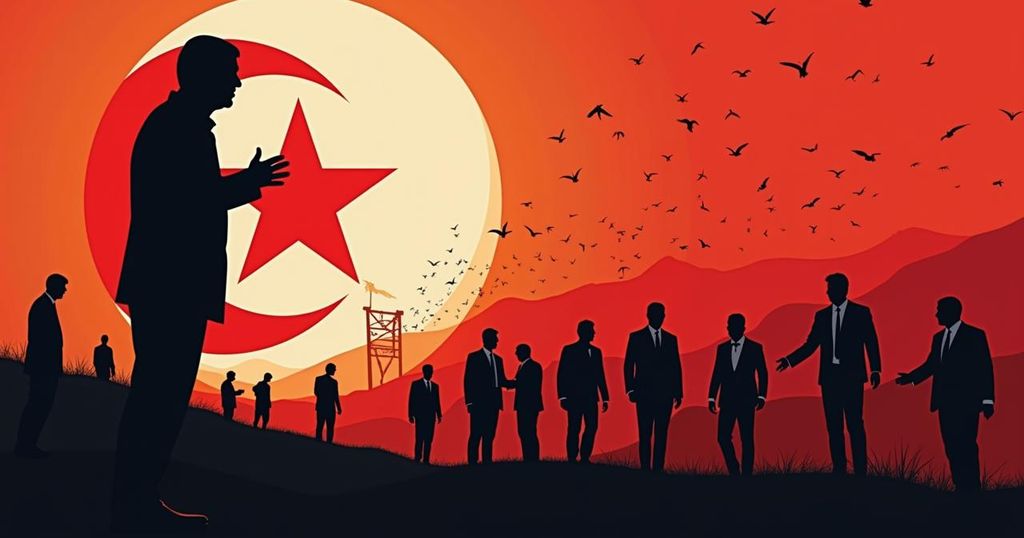Tunisia’s upcoming presidential election on October 6 features incumbent Kais Saied and two candidates: the imprisoned Ayachi Zammel and Zouhair Magzhaoui, perceived as a supporter of Saied. With many other candidates disqualified, critics argue the election is not legitimate, prompting protests and highlighting the country’s political repression. As disillusionment grows, voter participation remains alarmingly low, showcasing the erosion of democratic engagement in Tunisia.
In the upcoming presidential election in Tunisia, scheduled for October 6, only two candidates have been officially approved to run against the incumbent President Kais Saied: Zouhair Magzhaoui and Ayachi Zammel, the latter of whom is currently imprisoned. Critics of the election process assert that it is heavily skewed in favor of Saied, raising concerns about the future of democracy in Tunisia. Magzhaoui is perceived as a nominal candidate sympathetic to Saied’s regime, while Zammel, leader of the liberal Azimoun party, faces serious legal challenges, with multiple prison sentences stemming from accusations of falsifying documents related to his candidacy. The electoral landscape has been further complicated by the Independent High Authority for Elections (ISIE) declaring many candidates ineligible to participate, effectively limiting the electoral choices and maintaining the status quo. This move has been met with public protests, as citizens demand fair elections and express discontent with increasing restrictions on civil liberties and free speech under Saied’s administration. While Zammel attempts to campaign from prison, it is evident that the election is characterized by an atmosphere of political repression, fueling public disillusionment with traditional politics. Many Tunisians have withdrawn from electoral engagement altogether, with a mere 11 percent voter turnout recorded during the 2022 parliamentary elections, an indication of widespread disenchantment. As the election approaches, it remains clear that the incumbent, Kais Saied, is likely to secure a decisive victory amidst the constrained political climate and absence of formidable opposition.
Tunisia’s forthcoming presidential election poses significant implications for the nation’s democratic framework, especially given the political maneuvers and reforms initiated by President Kais Saied since his power consolidation in July 2021. After dissolving parliament and governing through decrees, Saied subsequently undertook a process of constitutional reform, leading to widespread condemnation from opposition groups and civil society activists. This election, touted as rigged by critics, comes against a backdrop of diminished political plurality, with the ISIE disqualifying numerous candidates while concurrently strengthening Saied’s grip on power. The candidacies of only two figures, Zouhair Magzhaoui and Ayachi Zammel, raise questions regarding the authenticity of the electoral process and the viability of dissenting political voices.
The presidential election in Tunisia is emblematic of the ongoing struggle for democracy amid rising authoritarian tendencies under President Kais Saied. The approved candidates—Zouhair Magzhaoui and Ayachi Zammel—highlight the lack of genuine political competition, as Zammel’s imprisonment and Magzhaoui’s alignment with Saied suggest a foregone conclusion for the incumbent. Public sentiments of disillusionment and protest reflect a broader crisis of confidence in Tunisia’s political institutions, casting a shadow over the legitimacy of the electoral process. Therefore, this election serves as a critical juncture for the future of Tunisia’s democracy.
Original Source: www.aljazeera.com






